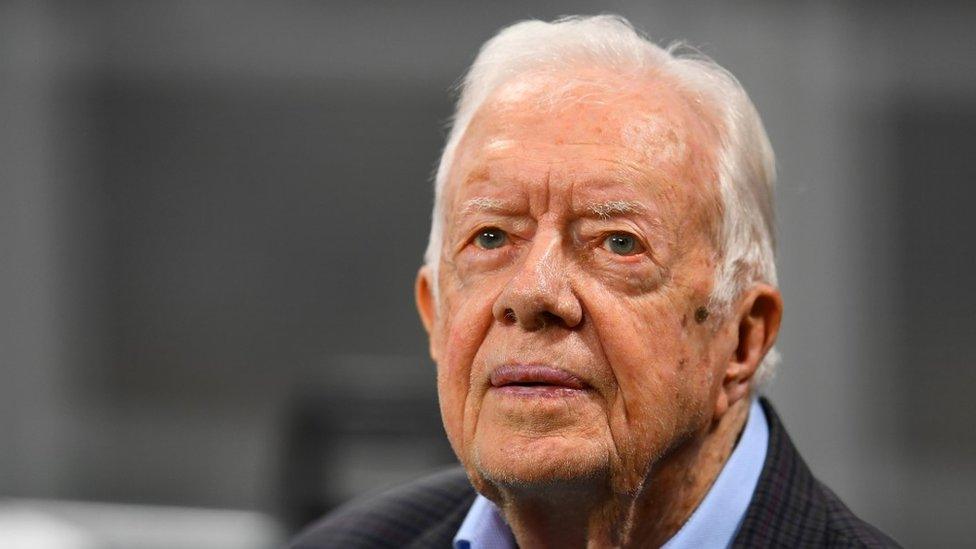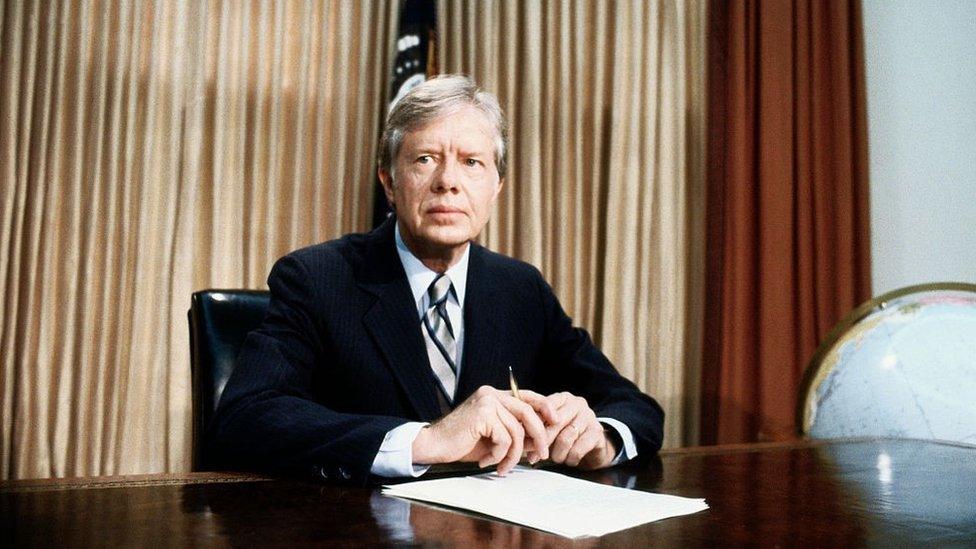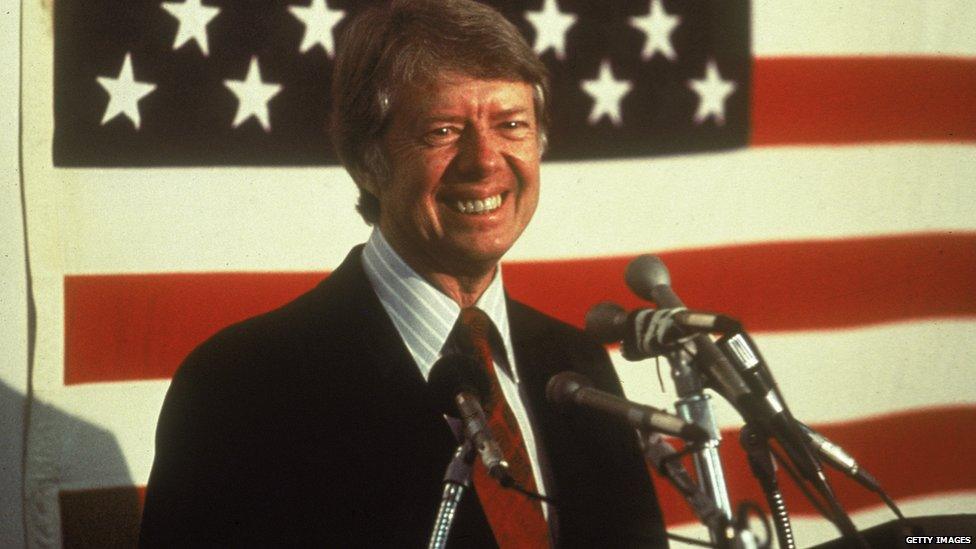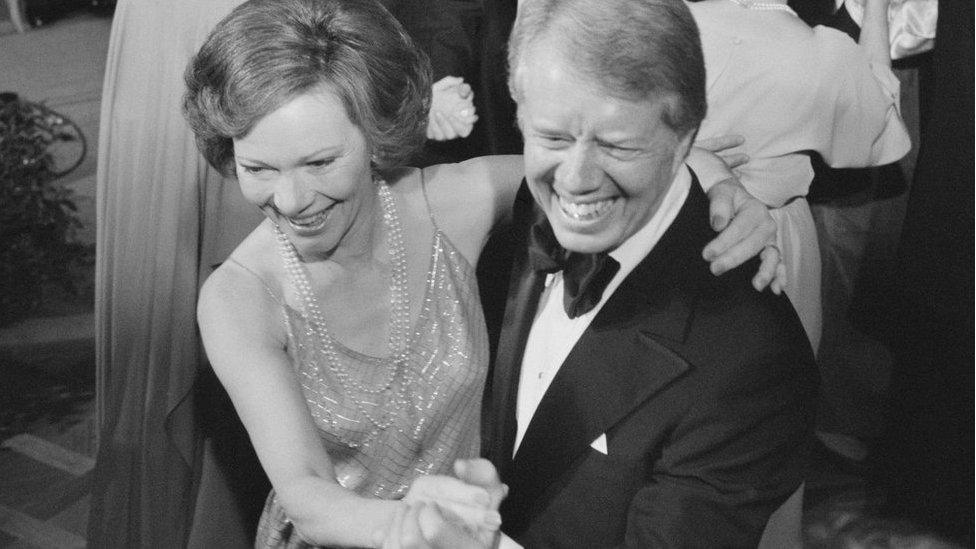Former US President Jimmy Carter to receive hospice care
- Published

Former US President Jimmy Carter will end medical treatment and enter hospice care at his Georgia home, his foundation announced on Saturday.
The Carter Center said Mr Carter had decided to "spend his remaining time at home with his family," but did not say what had prompted the decision.
Mr Carter, 98, has suffered from recent health issues, including a melanoma that spread to his liver and brain.
The country's oldest living leader, he served one term in office from 1977-81.
During his tenure as president Mr Carter faced a spate of foreign policy challenges and the Democrat was defeated in his re-election bid by Ronald Reagan.
"He has the full support of his family and his medical team. The Carter family asks for privacy during this time and is grateful for the concern shown by his many admirers," the Carter Center said in a statement on Saturday.
Terminally ill patients may seek hospice care instead of going through further medical treatment. The priority is not to provide further treatment, but to provide comfort towards the end of a patient's life.
Mr Carter's grandson, Jason Carter, a former Georgia state senator, tweeted that he visited "both of my grandparents yesterday."
"They are at peace and - as always - their home is full of love. Thank you all for your kind words," he said.
In 2021, Mr Carter and his wife Roslyn celebrated their 75th wedding anniversary. They have four children together.
In a tweet on Sunday, US President Joe Biden wrote that he and his wife, Jill Biden, were praying for their "friends Jimmy and Rosalynn".
"We admire you for the strength and humility you have shown in difficult times," Mr Biden wrote. "May you continue your journey with grace and dignity, and God grant you peace."
Born in Georgia in 1924, Mr Carter entered politics in the 1960s when he was elected as state senator, before becoming the state's governor in 1971.
Five years later he defeated the sitting Republican President Gerald Ford to become the 39th commander-in-chief.
But problems quickly mounted for Mr Carter as president.
At home, an oil crisis produced high inflation and unemployment, and he struggled to persuade Americans to accept the required austerity measures.
The high-point of the Carter years was the signing of the Camp David Accords in 1978 in which Egypt formally recognised the state of Israel. He also signed a treaty returning control of the Panama Canal to Panama.
But in 1979 the last Shah of Iran was overthrown and 66 Americans were taken hostage in Tehran in the aftermath. Mr Carter cut off diplomatic relations with Iran in response and introduced a trade embargo.
However, the public did not believe he was being tough enough and his popularity slumped as the US hostages were held for 444 days. His approval ratings took a further hit after an attempt to rescue the hostages failed and eight US military members were killed.
Iran then delayed the release of the hostages until after Ronald Reagan was sworn in.

Carter defeated the sitting Republican President Gerald Ford to become the 39th president
Since leaving the White House, Mr Carter has remained active, carrying out humanitarian work with his Carter Center.
He led a delegation that sought to persuade military leaders in Haiti to surrender power in 1994 and he brokered a ceasefire in Bosnia that helped pave the way for the future peace treaty there.
He went on to gain an international reputation for his work in promoting human rights, winning a Nobel Peace Prize in 2002.
With Nelson Mandela, he founded The Elders, a group of global leaders who committed themselves to work on peace and human rights.
He also travelled extensively - well into his early 90s - and took part in annual trips to build homes with the Habitat for Humanity charity.
But the former president has also battled a host of health issues in recent years. In August 2015, Mr Carter had a small cancerous mass removed from his liver.
The following year he announced that he needed no further treatment, as an experimental drug had eliminated any sign of cancer.
He has frequently expressed a striking calmness when dealing with his health challenges.
"I'm perfectly at ease with whatever comes," he said in 2015. "I've had an exciting, adventurous and gratifying existence."
Mr Carter celebrated his most recent birthday in October in Plains, the tiny Georgia town where he and his wife were born between the First World War and the Great Depression, and where they returned when he left office.
A host of senior US politicians - including Democratic Senate leader Chuck Schumer, New York Governor Kathy Hochul and Georgia Senator Raphael Warnock - offered their thoughts and prayers to Mr Carter's family as news broke on Saturday night.
"In this tender time of transitioning, God is surely walking with him," Senator Warnock tweeted. "May he, Rosalynn & the entire Carter family be comforted with that peace and surrounded by our love & prayers."
Related topics
- Published6 December 2015

- Published7 July 2021
